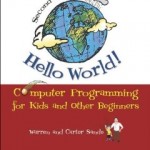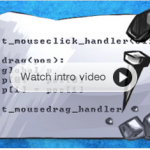Python for kids
Many of my friends are having kids nowadays and asking me what are good resources for teaching kids Python. I don’t have any kids but I do know of some good resources for learning Python especially for younger children or people completely new to programming. Here they are:
 Python for Kids is a lighthearted introduction to the Python language and to programming in general, complete with illustrations and kid-friendly examples. We begin with the basics of how to install Python and write simple commands. In bite-sized chapters, you’ll discover the essentials of Python, including how to use Python’s extensive standard library, the difference between strings and lists, and using for-loops and while-loops. By the end of the book, readers have built a couple of games and created drawings with Python’s graphics library, Tkinter. Each chapter closes with fun and relevant exercises that challenge the reader to put their newly acquired knowledge to the test.
Python for Kids is a lighthearted introduction to the Python language and to programming in general, complete with illustrations and kid-friendly examples. We begin with the basics of how to install Python and write simple commands. In bite-sized chapters, you’ll discover the essentials of Python, including how to use Python’s extensive standard library, the difference between strings and lists, and using for-loops and while-loops. By the end of the book, readers have built a couple of games and created drawings with Python’s graphics library, Tkinter. Each chapter closes with fun and relevant exercises that challenge the reader to put their newly acquired knowledge to the test.
 Hello World! Computer Programming for Kids and Other Beginners provides a gentle but thorough introduction to the world of computer programming. It’s written in language a 12-year-old can follow, but anyone who wants to learn how to program a computer can use it. Even adults. Written by Warren Sande and his son, Carter, and reviewed by professional educators, this book is kid-tested and parent-approved. Note: there is a newer edition of this book available for pre-order.
Hello World! Computer Programming for Kids and Other Beginners provides a gentle but thorough introduction to the world of computer programming. It’s written in language a 12-year-old can follow, but anyone who wants to learn how to program a computer can use it. Even adults. Written by Warren Sande and his son, Carter, and reviewed by professional educators, this book is kid-tested and parent-approved. Note: there is a newer edition of this book available for pre-order.
 Invent Your Own Computer Games with Python teaches you how to program in the Python programming language. Each chapter ives you the complete source code for a new game, and then teaches the programming concepts from the example. It was written to be understandable by kids as young as 10-12 years old, although it is great for anyone of any age who has never programmed before.
Invent Your Own Computer Games with Python teaches you how to program in the Python programming language. Each chapter ives you the complete source code for a new game, and then teaches the programming concepts from the example. It was written to be understandable by kids as young as 10-12 years old, although it is great for anyone of any age who has never programmed before. Scratch is a programming language that makes it easy to create your own interactive stories, animations, games, music and art, and share your creations on the web. The Scratch website has over 3 million project from around the world many submitted by kids. Scratch is developed by the Lifelong Kindergarten Group at the MIT Media Lab. Tynker is a startup inspired by Scratch.
Scratch is a programming language that makes it easy to create your own interactive stories, animations, games, music and art, and share your creations on the web. The Scratch website has over 3 million project from around the world many submitted by kids. Scratch is developed by the Lifelong Kindergarten Group at the MIT Media Lab. Tynker is a startup inspired by Scratch. An Introduction to Interactive Programming with Python is a course designed to be a fun introduction to the basics of programming in Python. This course is designed to help students with very little or no computing background learn the basics of building simple interactive applications. The main focus is on building simple interactive games such as Pong, Blackjack and Asteroids.
An Introduction to Interactive Programming with Python is a course designed to be a fun introduction to the basics of programming in Python. This course is designed to help students with very little or no computing background learn the basics of building simple interactive applications. The main focus is on building simple interactive games such as Pong, Blackjack and Asteroids.
This is by no means an exhaustive list of resources. If you know of other good ones, please leave a comment below!

